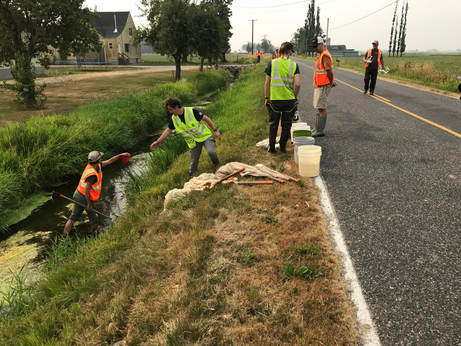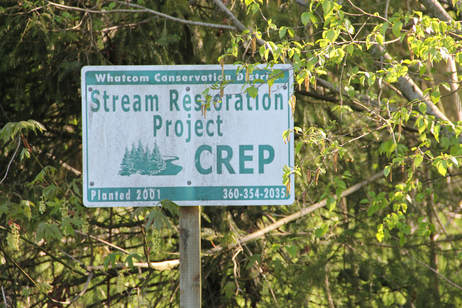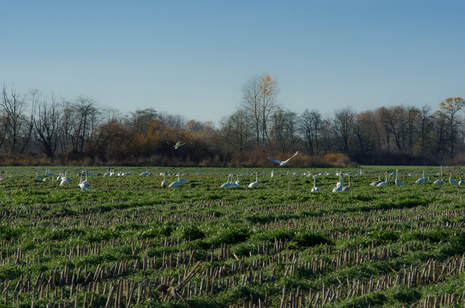 Crews from Whatcom Conservation District, Washington Department of Fish and Wildlife, Washington Department of Ecology, City of Bellingham, City of Lynden and others work to try to save salmon and other aquatic life stranded in Double Ditch Stream. Crews from Whatcom Conservation District, Washington Department of Fish and Wildlife, Washington Department of Ecology, City of Bellingham, City of Lynden and others work to try to save salmon and other aquatic life stranded in Double Ditch Stream. Larry Stap is a fourth generation dairy farmer and co-owner of the popular glass bottled dairy product brand, TwinBrook Creamery, with his son-in-law and daughter. Their farm lies adjacent to the stream along with the Fishtrap creek, hence “twin brook.” When Stap saw the dying fish, he and co-owner Mark Tolsma made an immediate decision: divert their much needed irrigation water into the struggling stream. Well water was pumped into the stream and helped provide the time needed to rescue as many of the remaining fish as possible. It wasn’t the first time Whatcom’s family farmers sacrificed to divert water into streams during the low flow times of late summer. For several years, farmers in the Bertrand Watershed Improvement District worked with state officials to allow them to use well water to pump cold, oxygenated water into the Bertrand creek to support fish habitat. Legal decisions and bureaucratic processes delayed the effort for a couple of years. This action followed the earlier voluntary diversion of water rights. Farmers for years have had the legal right to draw irrigation water directly from the stream, but now understand that during the heat of summer more water is needed in the creek so have been allowed to convert those surface water rights to groundwater rights allowing them to use wells for irrigation. More rights could be converted but unfortunate legal decisions have hindered that process. These are just two of literally hundreds of examples of what Whatcom Family Farmers are calling REAL: Real Environmental Action and Leadership. The public doesn’t automatically think of farmers as environmental activists, and indeed they aren’t in the sense of protesting, suing and lobbying. But they might instead be called “environmental actionists” because of the proactive and positive actions taken to help protect the environment. A few more examples:


The strict farming regulations combined with literally hundreds of proactive measures taken by farmers to protect the environment are working. Recent monitoring by the Department of Ecology shows that groundwater quality nearest our dairy farms is actually improving. Nitrate levels are restricted by EPA regulations and nitrate above the EPA limit is very common in most areas where farming has long existed. This is because until about the 1970s no one was aware that the heavy use of fertilizer, either organic as in cow manure or commercial fertilizer, meant that excess nitrogen was leaching into groundwater. We now know that it takes 3o to 50 years of improved farm practices to affect nitrate levels in groundwater and the fact that in Whatcom County we are seeing improvement means that what farmers are doing is positively working. Farming has always had an impact on the environment and problems continue as we hear more and more about environmental impacts of farming across the nation and world. Whatcom farmers clearly understand that not all problems have been solved and the potential for contamination remains. That’s one reason why farmers have come together in groups such as the six Watershed Improvement Districts and Whatcom Family Farmers. Together farmers can encourage each other, support positive policy actions and improve public understanding of the REAL environmental leadership farmers provide.
0 Comments
After watching agriculture fail in previous places they had lived, the Belisles were drawn to Whatcom County for its vibrant farming community. Along with their family, they planted their first orchard over 20 years ago. The Belisle’s now grow over 25,000 fruit trees and have opened a cafe and distillery! Bellewood Acres is a haven for locals as well as providing a taste of country life to those looking to escape from town for the afternoon. However, it’s the environmental example they set behind the scenes which makes the biggest impact.
When the drainage district came to Dorie for help concerning the grass filled, mud clogged Four Mile creek, she set to work enlisting her fellow farmers to solve the drainage problem. She soon learned just how much her community valued creating sustainable practices to protect their natural resources. Dorie was joined by a team of farmers who were committed to conserving water quality, for the sake of both fish and farming. Not only were the stagnant streams causing flooding of the nearby fields making it difficult to farm safely, but the natural fish habitats were slowly being choked out. The goal of these farmers was to restore Four Mile Creek to a full flowing stream–a place fish could thrive without taking additional land from nearby agriculture. This team set about clearing out the stream and drainage areas. This process allowed new plant growth along the banks which supported the water achieving all required parameters for oxygen, fecal coliform, and temperature. Only two fish from the salmon family were counted in the initial 2003 dredge of the creek. Since then in recent upkeep cleanings, that number has risen to 250. The increased flow of Four Mile also reduced flooding in area, in turn allowing crops to be grown and harvested properly. With the support of government grants, these REAL farmer-environmentalists continue to keep the stream clear and healthy. Farmers are continually learning and changing to be better stewards of the land, passing those lessons down to the next generations. Challenges like the Four Mile creek are being met with passion, and results are beginning to show. Restoring thriving streams is as vital for the farmers as it is for the fish, and projects like this are a prime example of how farming is leading the charge for environmental change. |
AuthorWrite something about yourself. No need to be fancy, just an overview. Archives
November 2023
Categories
All
|
 RSS Feed
RSS Feed